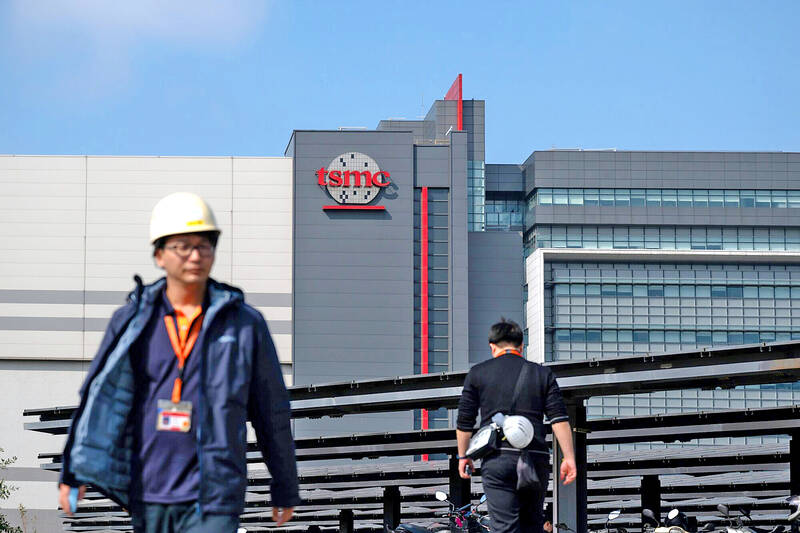Taiwan Semiconductor Manufacturing Co (TSMC, 台積電) yesterday reported about 60 percent annual growth in revenue for last month, benefiting from rapidly growing demand for artificial intelligence (AI) and high-performance computing applications.
Revenue last month expanded to NT$236.02 billion (US$7.28 billion), compared with NT$147.9 billion in April last year, the second-highest level in company history, TSMC said in a statement. On a monthly basis, revenue surged 20.9 percent, from NT$195.21 billion in March.
As AI-related applications continue to show strong growth, TSMC expects revenue to expand about 27.6 percent year-on-year during the current quarter to between US$19.6 billion and US$20.4 billion.

Photo: Mike Kai Chen, Bloomberg
That would mean a sequential growth of 6 percent, the chipmaker told investors last month.
“Almost all the AI innovators are working with TSMC to address the insatiable AI-related demand for energy-efficient computing power,” TSMC CEO C.C. Wei (魏哲家) told an investors’ conference.
The chipmaker forecasts that server AI processor revenue would more than double this year from last year and account for a low-teens percentage of its total revenue this year, Wei said.
As a majority of AI accelerators and graphics processors utilize its advanced process technologies, such as 5-nanometer or 4-nanometer technology and beyond, revenue this quarter would be supported by strong demand for 5-nanometer and 3-nanometer technologies, TSMC said.
That would partly offset weakness in smartphone chip demand during the slack season and sagging demand for vehicle chips on excessive inventory, the chipmaker said.
Last quarter, 5-nanometer technology was the largest revenue contributor, accounting for 37 percent of the chipmaker’s total revenue, while 3-nanometer technology made up 9 percent, TSMC said.
The Hsinchu-based company said all its AI chip customers are working on further technology migration to energy-efficient 2-nanometer technology, considering that AI servers consume much more power than general-purpose models.
TSMC is scheduled to ramp up 2-nanometer technology in the second half of next year.
In a separate statement, TSMC said its board of directors has approved the distribution of a NT$4 per share cash dividend for the first quarter of this year, higher than the NT$3.5 a share paid for the final quarter of last year.
The company made NT$225.49 billion in net profit, or NT$8.7 per share, in the first quarter of this year. TSMC usually pays 70 percent of its free cash flow in a year as a cash dividend.
However, as it is harvesting from the heavy investment in the past few years, the chipmaker expects its cash dividend to “steadily increase” from a sustainable level in the past few years.
The cash dividend distribution is subject to the final approval of shareholders during the annual general meeting scheduled for June 4.

Nvidia Corp chief executive officer Jensen Huang (黃仁勳) on Monday introduced the company’s latest supercomputer platform, featuring six new chips made by Taiwan Semiconductor Manufacturing Co (TSMC, 台積電), saying that it is now “in full production.” “If Vera Rubin is going to be in time for this year, it must be in production by now, and so, today I can tell you that Vera Rubin is in full production,” Huang said during his keynote speech at CES in Las Vegas. The rollout of six concurrent chips for Vera Rubin — the company’s next-generation artificial intelligence (AI) computing platform — marks a strategic

REVENUE PERFORMANCE: Cloud and network products, and electronic components saw strong increases, while smart consumer electronics and computing products fell Hon Hai Precision Industry Co (鴻海精密) yesterday posted 26.51 percent quarterly growth in revenue for last quarter to NT$2.6 trillion (US$82.44 billion), the strongest on record for the period and above expectations, but the company forecast a slight revenue dip this quarter due to seasonal factors. On an annual basis, revenue last quarter grew 22.07 percent, the company said. Analysts on average estimated about NT$2.4 trillion increase. Hon Hai, which assembles servers for Nvidia Corp and iPhones for Apple Inc, is expanding its capacity in the US, adding artificial intelligence (AI) server production in Wisconsin and Texas, where it operates established campuses. This

US President Donald Trump on Friday blocked US photonics firm HieFo Corp’s US$3 million acquisition of assets in New Jersey-based aerospace and defense specialist Emcore Corp, citing national security and China-related concerns. In an order released by the White House, Trump said HieFo was “controlled by a citizen of the People’s Republic of China” and that its 2024 acquisition of Emcore’s businesses led the US president to believe that it might “take action that threatens to impair the national security of the United States.” The order did not name the person or detail Trump’s concerns. “The Transaction is hereby prohibited,”

Garment maker Makalot Industrial Co (聚陽) yesterday reported lower-than-expected fourth-quarter revenue of NT$7.93 billion (US$251.44 million), down 9.48 percent from NT$8.76 billion a year earlier. On a quarterly basis, revenue fell 10.83 percent from NT$8.89 billion, company data showed. The figure was also lower than market expectations of NT$8.05 billion, according to data compiled by Yuanta Securities Investment and Consulting Co (元大投顧), which had projected NT$8.22 billion. Makalot’s revenue this quarter would likely increase by a mid-teens percentage as the industry is entering its high season, Yuanta said. Overall, Makalot’s revenue last year totaled NT$34.43 billion, down 3.08 percent from its record NT$35.52